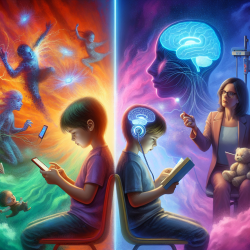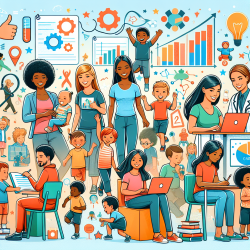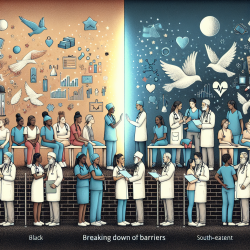Introduction
In today's digital age, screens have become an integral part of children's lives. However, recent research suggests that screen-based storytelling may not be the best approach for developing narrative comprehension in preschool children. A study titled "Hyperconnectivity during screen-based stories listening is associated with lower narrative comprehension in preschool children exposed to screens vs dialogic reading: An EEG study" provides compelling evidence on this topic.
The Study: Screen-Based vs. Dialogic Reading
The study involved 32 preschoolers aged 4 to 6, divided into two groups: one exposed to dialogic reading (DR) and the other to screen-based storytelling (SSG). Using EEG, researchers measured narrative comprehension and vocabulary development. The findings were clear: the DR group showed improved vocabulary and reduced functional connectivity, suggesting better narrative comprehension.
Why Dialogic Reading Outperforms Screen-Based Storytelling
Dialogic reading involves interactive storytelling, where adults ask open-ended questions and engage children in discussions about the story. This method stimulates brain areas associated with language and attention, leading to better vocabulary and comprehension. In contrast, screen-based storytelling lacks this interactive element, resulting in higher functional connectivity and lower comprehension.
Implications for Practitioners
- Engage in Dialogic Reading: Encourage interactive reading sessions with children. Use prompts to engage them in discussions about the story.
- Limit Screen Time: Reduce reliance on screen-based storytelling, especially for language development activities.
- Focus on Interaction: Foster an environment where children can ask questions and discuss stories, enhancing their narrative comprehension.
Encouraging Further Research
While this study provides valuable insights, further research is needed to explore the long-term effects of dialogic reading and screen-based storytelling on language development. Practitioners are encouraged to conduct longitudinal studies to better understand these impacts.
Conclusion
The findings from this study highlight the importance of dialogic reading in developing narrative comprehension and vocabulary in preschool children. By engaging children in interactive storytelling, we can enhance their language skills and prepare them for future academic success.
To read the original research paper, please follow this link: Hyperconnectivity during screen-based stories listening is associated with lower narrative comprehension in preschool children exposed to screens vs dialogic reading: An EEG study.










